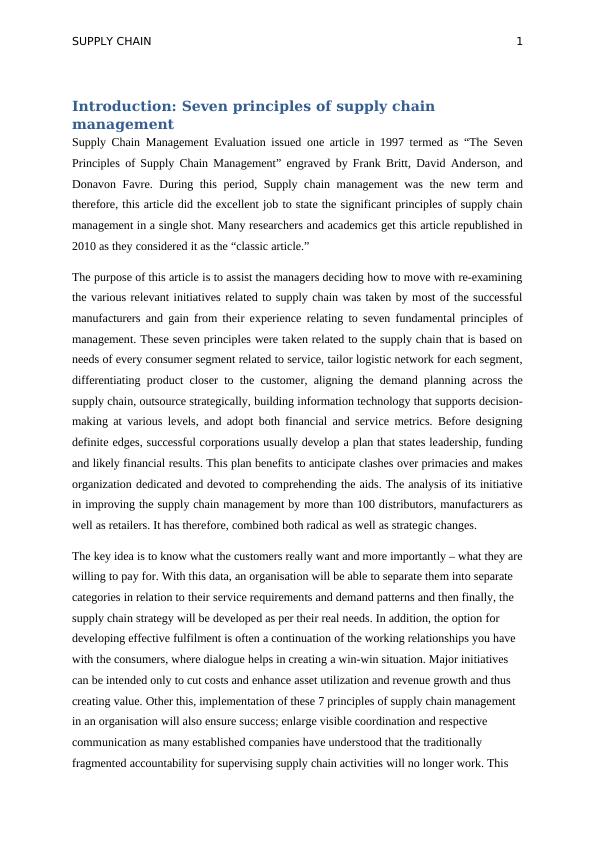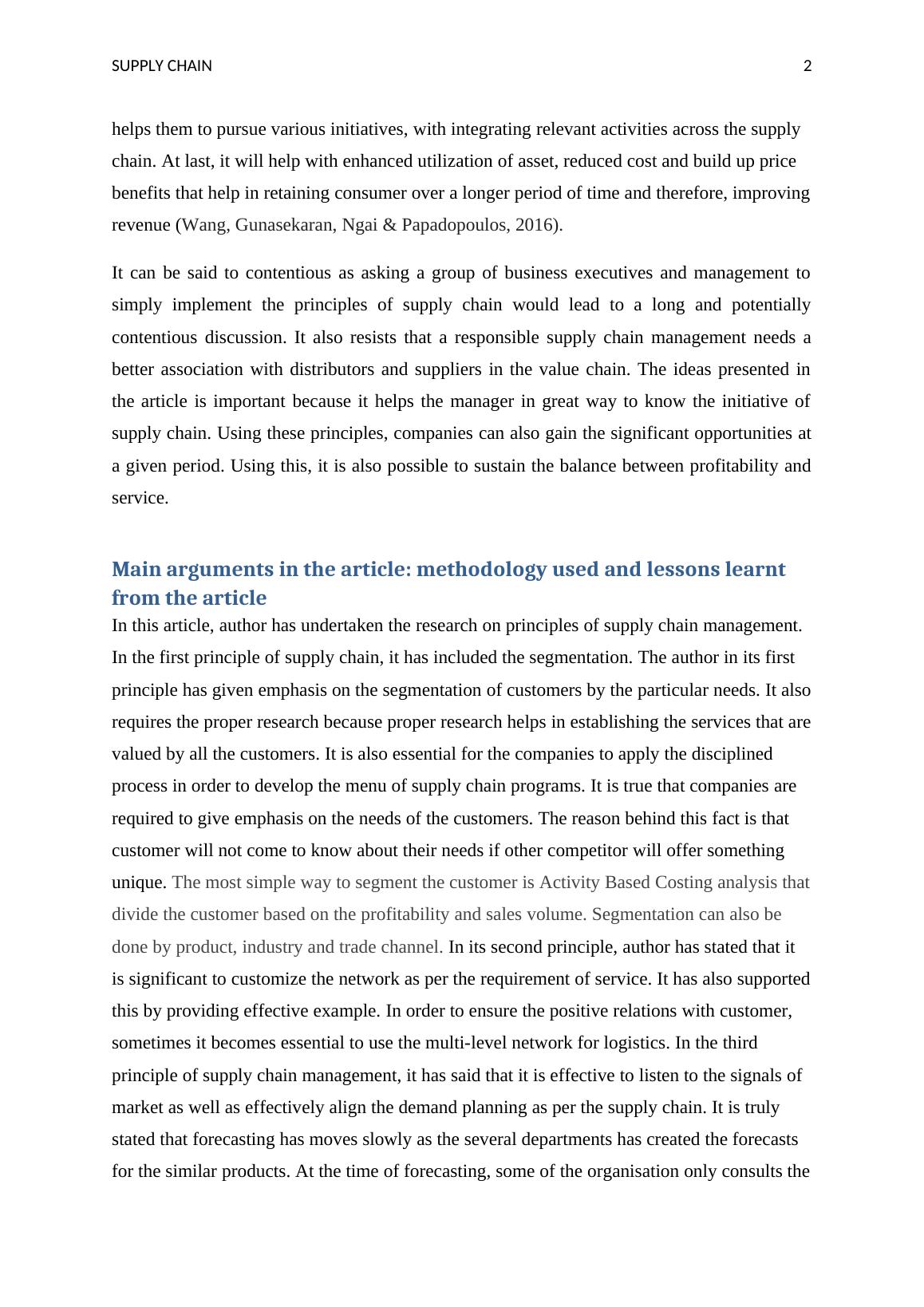Seven Principles of Supply Chain Management
Added on 2022-12-15
7 Pages2366 Words281 Views
Running Head: SUPPLY CHAIN 0
Supply Chain
Supply Chain

SUPPLY CHAIN 1
Introduction: Seven principles of supply chain
management
Supply Chain Management Evaluation issued one article in 1997 termed as “The Seven
Principles of Supply Chain Management” engraved by Frank Britt, David Anderson, and
Donavon Favre. During this period, Supply chain management was the new term and
therefore, this article did the excellent job to state the significant principles of supply chain
management in a single shot. Many researchers and academics get this article republished in
2010 as they considered it as the “classic article.”
The purpose of this article is to assist the managers deciding how to move with re-examining
the various relevant initiatives related to supply chain was taken by most of the successful
manufacturers and gain from their experience relating to seven fundamental principles of
management. These seven principles were taken related to the supply chain that is based on
needs of every consumer segment related to service, tailor logistic network for each segment,
differentiating product closer to the customer, aligning the demand planning across the
supply chain, outsource strategically, building information technology that supports decision-
making at various levels, and adopt both financial and service metrics. Before designing
definite edges, successful corporations usually develop a plan that states leadership, funding
and likely financial results. This plan benefits to anticipate clashes over primacies and makes
organization dedicated and devoted to comprehending the aids. The analysis of its initiative
in improving the supply chain management by more than 100 distributors, manufacturers as
well as retailers. It has therefore, combined both radical as well as strategic changes.
The key idea is to know what the customers really want and more importantly – what they are
willing to pay for. With this data, an organisation will be able to separate them into separate
categories in relation to their service requirements and demand patterns and then finally, the
supply chain strategy will be developed as per their real needs. In addition, the option for
developing effective fulfilment is often a continuation of the working relationships you have
with the consumers, where dialogue helps in creating a win-win situation. Major initiatives
can be intended only to cut costs and enhance asset utilization and revenue growth and thus
creating value. Other this, implementation of these 7 principles of supply chain management
in an organisation will also ensure success; enlarge visible coordination and respective
communication as many established companies have understood that the traditionally
fragmented accountability for supervising supply chain activities will no longer work. This
Introduction: Seven principles of supply chain
management
Supply Chain Management Evaluation issued one article in 1997 termed as “The Seven
Principles of Supply Chain Management” engraved by Frank Britt, David Anderson, and
Donavon Favre. During this period, Supply chain management was the new term and
therefore, this article did the excellent job to state the significant principles of supply chain
management in a single shot. Many researchers and academics get this article republished in
2010 as they considered it as the “classic article.”
The purpose of this article is to assist the managers deciding how to move with re-examining
the various relevant initiatives related to supply chain was taken by most of the successful
manufacturers and gain from their experience relating to seven fundamental principles of
management. These seven principles were taken related to the supply chain that is based on
needs of every consumer segment related to service, tailor logistic network for each segment,
differentiating product closer to the customer, aligning the demand planning across the
supply chain, outsource strategically, building information technology that supports decision-
making at various levels, and adopt both financial and service metrics. Before designing
definite edges, successful corporations usually develop a plan that states leadership, funding
and likely financial results. This plan benefits to anticipate clashes over primacies and makes
organization dedicated and devoted to comprehending the aids. The analysis of its initiative
in improving the supply chain management by more than 100 distributors, manufacturers as
well as retailers. It has therefore, combined both radical as well as strategic changes.
The key idea is to know what the customers really want and more importantly – what they are
willing to pay for. With this data, an organisation will be able to separate them into separate
categories in relation to their service requirements and demand patterns and then finally, the
supply chain strategy will be developed as per their real needs. In addition, the option for
developing effective fulfilment is often a continuation of the working relationships you have
with the consumers, where dialogue helps in creating a win-win situation. Major initiatives
can be intended only to cut costs and enhance asset utilization and revenue growth and thus
creating value. Other this, implementation of these 7 principles of supply chain management
in an organisation will also ensure success; enlarge visible coordination and respective
communication as many established companies have understood that the traditionally
fragmented accountability for supervising supply chain activities will no longer work. This

SUPPLY CHAIN 2
helps them to pursue various initiatives, with integrating relevant activities across the supply
chain. At last, it will help with enhanced utilization of asset, reduced cost and build up price
benefits that help in retaining consumer over a longer period of time and therefore, improving
revenue (Wang, Gunasekaran, Ngai & Papadopoulos, 2016).
It can be said to contentious as asking a group of business executives and management to
simply implement the principles of supply chain would lead to a long and potentially
contentious discussion. It also resists that a responsible supply chain management needs a
better association with distributors and suppliers in the value chain. The ideas presented in
the article is important because it helps the manager in great way to know the initiative of
supply chain. Using these principles, companies can also gain the significant opportunities at
a given period. Using this, it is also possible to sustain the balance between profitability and
service.
Main arguments in the article: methodology used and
lessons learnt from the article
In this article, author has undertaken the research on principles of supply chain management.
In the first principle of supply chain, it has included the segmentation. The author in its first
principle has given emphasis on the segmentation of customers by the particular needs. It also
requires the proper research because proper research helps in establishing the services that are
valued by all the customers. It is also essential for the companies to apply the disciplined
process in order to develop the menu of supply chain programs. It is true that companies are
required to give emphasis on the needs of the customers. The reason behind this fact is that
customer will not come to know about their needs if other competitor will offer something
unique. The most simple way to segment the customer is Activity Based Costing analysis that
divide the customer based on the profitability and sales volume. Segmentation can also be
done by product, industry and trade channel. In its second principle, author has stated that it
is significant to customize the network as per the requirement of service. It has also supported
this by providing effective example. In order to ensure the positive relations with customer,
sometimes it becomes essential to use the multi-level network for logistics. In the third
principle of supply chain management, it has said that it is effective to listen to the signals of
market as well as effectively align the demand planning as per the supply chain. It is truly
stated that forecasting has moves slowly as the several departments has created the forecasts
for the similar products. At the time of forecasting, some of the organisation only consults the
helps them to pursue various initiatives, with integrating relevant activities across the supply
chain. At last, it will help with enhanced utilization of asset, reduced cost and build up price
benefits that help in retaining consumer over a longer period of time and therefore, improving
revenue (Wang, Gunasekaran, Ngai & Papadopoulos, 2016).
It can be said to contentious as asking a group of business executives and management to
simply implement the principles of supply chain would lead to a long and potentially
contentious discussion. It also resists that a responsible supply chain management needs a
better association with distributors and suppliers in the value chain. The ideas presented in
the article is important because it helps the manager in great way to know the initiative of
supply chain. Using these principles, companies can also gain the significant opportunities at
a given period. Using this, it is also possible to sustain the balance between profitability and
service.
Main arguments in the article: methodology used and
lessons learnt from the article
In this article, author has undertaken the research on principles of supply chain management.
In the first principle of supply chain, it has included the segmentation. The author in its first
principle has given emphasis on the segmentation of customers by the particular needs. It also
requires the proper research because proper research helps in establishing the services that are
valued by all the customers. It is also essential for the companies to apply the disciplined
process in order to develop the menu of supply chain programs. It is true that companies are
required to give emphasis on the needs of the customers. The reason behind this fact is that
customer will not come to know about their needs if other competitor will offer something
unique. The most simple way to segment the customer is Activity Based Costing analysis that
divide the customer based on the profitability and sales volume. Segmentation can also be
done by product, industry and trade channel. In its second principle, author has stated that it
is significant to customize the network as per the requirement of service. It has also supported
this by providing effective example. In order to ensure the positive relations with customer,
sometimes it becomes essential to use the multi-level network for logistics. In the third
principle of supply chain management, it has said that it is effective to listen to the signals of
market as well as effectively align the demand planning as per the supply chain. It is truly
stated that forecasting has moves slowly as the several departments has created the forecasts
for the similar products. At the time of forecasting, some of the organisation only consults the

End of preview
Want to access all the pages? Upload your documents or become a member.
Related Documents
Article on 7 Principles of Supply Chain Management - Deskliblg...
|18
|2953
|113
The 7 Principles of Supply Chain Managementlg...
|11
|2945
|201
Analyzing Supply Chain Management Based on Seven Principleslg...
|11
|2941
|144
Management assignmentlg...
|12
|2957
|262
Supply Chain Management in Debenhamslg...
|13
|3353
|74
Logistics and Supply Chain Management: Principles, Processes, and Competitiveness in Mark and Spencerlg...
|13
|4594
|135
